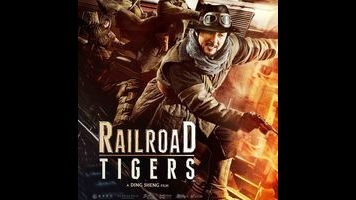The Jackie Chan wartime caper Railroad Tigers never builds up steam

The Chinese film industry’s insistence on proving that it can make blockbusters that are as dull and crummy as anything to come out of Hollywood (but at only half the cost) continues unabated with Railroad Tigers, a hodgepodge of gags and forgettable chase scenes set during the Second Sino-Japanese War. Wearing heavy goggles and a David Gest beard, Jackie Chan stars as Ma Yuan, a railroad porter who leads a small group of train saboteurs in a fight against the Japanese occupation. It doesn’t sound too bad on paper: the onetime class clown of the Hong Kong action school paying homage to one of his biggest influences, the Buster Keaton classic The General, with a train-set wartime comedy of his own. But Chan is now 62 years old, no longer the daredevil who might break a few bones for a stunt. Compared to the humor and excitement of, say, the train set piece of Police Story 3 (also known as Supercop), the action sequences of his new film are interminable and reliant on bargain-priced CGI that never contrasts the bug-eyed mugging of the cast with anything like an illusion of danger.
But Chan’s latter-day reliance on digital effects might not even be that big a problem (he has charisma to spare) if he weren’t working once again with Ding Sheng (Police Story: Lockdown), a mainland director who seems to get progressively worse at pacing and structure with every film. Agreeing to blow up a bridge on behalf of the Communist Eighth Route Army, Ma and his band of generic monkey-wrenchers (the heartthrob, the one with a murky past, the fat one, etc.) are pitted against Capt. Yamaguchi (Hiroyuki Ikeuchi), a scowling villain with a skunklike Mallen streak in his hair. The plot is simple, the good guys are righteous and know how to have a good time, and the bad guys are unapologetically cartoonish and stereotypical: bumbling Japanese infantrymen, groveling Chinese collaborationists, even a female assassin with a back tattoo. It takes a special anti-talent to make a movie that’s hard to follow out of material this broad.
From the splashy freeze-frames (think Guy Ritchie by way of a motion-graphics mid-term project) and bizarre slow fades to black to the enervatingly long time it takes for the film to get going, Railroad Tigers plays like a master class in how to bungle a film narrative. (There’s also the unnecessary modern-day framing device, apparently a must for super-patriotic historical fantasies made in China; this one involves a little boy, a magical museum exhibit, and for some reason, Hong Kong superstar Andy Lau.) Chan’s timing and Ikeuchi’s scenery-chewing are sometimes able to rescue the protracted climax, which is more entertaining in conception than execution. A duel between two tanks on a moving flatcar, with the barrels of the tank guns knocking against each other like swords, is fairly typical, in that one can imagine it being a heck of a lot better in the hands of director with more than a perfunctory sense of craft.
There are filmmakers who can make something fun out of fake-looking effects—including Tsui Hark, who made a similar film with The Taking Of Tiger Mountain—but Ding isn’t one of them. At its best, in overtly comic set pieces like the train heist that introduces Ma’s Railroad Tigers, his film is mildly diverting; at its worst, as in much of the finale, it’s an unpalatable mixture of nationalist pomp and half-assed green-screen effects that tries to honor its heroes’ refusal to give up by refusing to arrive at an ending. Unintentionally, the movie summarizes itself in the outtakes that play over the end credits. These have been a staple of Jackie Chan movies since the 1980s, but instead of the usual behind-the-scenes reveals, messed-up stunts, and laughed-off injuries, the audience is treated to several thrilling minutes of actors slightly flubbing their lines and forgetting their characters’ names.